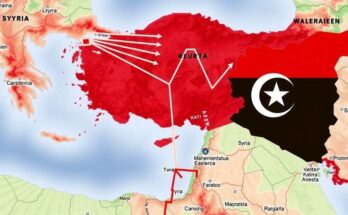Tropical Cyclone Chido has hit Mayotte and the Comoros, threatening 2.5 million people, including 1.7 million in Mozambique. Wind and rain from the cyclone could lead to flash floods and mudslides. Significant impacts have already been reported in Anjouan, with damages evident; other regions are also preparing for potentially severe conditions as the cyclone approaches Mozambique and Malawi.
As of December 14, 2024, Tropical Cyclone Chido has severely impacted Mayotte and the Comoros, bringing with it extreme winds and torrential rainfall, likely resulting in significant flooding and mudslides. Approximately 2.5 million individuals are situated in the cyclone’s projected path, with over 1.7 million in Mozambique, 440,000 in Malawi, and about 370,000 in the Comoros. On December 13, Chido passed close to northern Madagascar, where no immediate damages have been reported, and cyclone warnings have now been lifted. However, ongoing assessments are being conducted by the local authorities regarding any potential impacts.
The cyclone has initially brought notable damage to Mayotte, where exceptional wind conditions have been compared to historical events such as Tropical Kamisy in 1984. As the storm moves westward, it is expected to maintain its intensity while crossing the northern Mozambique Channel, impacting the Comoros islands today and making landfall in northern Mozambique on December 15. In the Comoros, areas like Anjouan faced destruction to several homes, while efforts to locate 11 missing fishermen are underway in Ngazidja.
In Mozambique, imminent threats of damaging winds and dangerous sea conditions are anticipated, with predictions of rain accumulations ranging from 100 to 200 mm over 12 to 24 hours. The cyclone’s remnants are projected to affect southern Malawi, bringing considerable rainfall and gusty winds until December 17, when the cyclone is expected to dissipate over southern African interior regions. Authorities throughout the region are meticulously assessing preparations and forming response strategies amidst this storm threat.
National and regional organizations are issuing cyclone advisories and preparing for the anticipated impacts. In the Comoros, the National Meteorological Service has declared a Code Orange alert while the Red Cross mobilizes to assist affected communities. Mozambique’s meteorological service has issued red alerts for critical provinces, prompting precautionary measures. Malawi’s Climate Change and Meteorological Services have likewise cautioned its population regarding the storm’s potential impact. Comprehensive preparations are essential to mitigate the anticipated effects of Tropical Cyclone Chido while monitoring continues for ongoing developments.
The severe weather phenomenon known as Tropical Cyclone Chido developed in the southeastern Indian Ocean Basin and has begun making landfall across Southern Africa. This cyclone has elicited concerns due to its projected trajectory, which places millions at risk, particularly in Mozambique, Malawi, and the Comoros. The region has historically faced challenges associated with tropical cyclones, making timely responses and preparedness efforts essential. Cyclones within this region often lead to widespread damage and humanitarian crises, prompting national and regional authorities to take proactive measures to safeguard communities and infrastructure. Given the heavy rainfall forecasted in the wake of Cyclone Chido, officials are gravely concerned about the potential for flash floods and mudslides.
In conclusion, Tropical Cyclone Chido poses a serious threat to millions living in its projected path. As it progresses across Southern Africa, it is vital that national and regional authorities continue their preparedness and response efforts to mitigate the cyclone’s impacts. Ongoing assessments and advisories are critical to ensuring the safety and well-being of communities vulnerable to flooding and other associated hazards. Swift and coordinated actions by all stakeholders are required to address the challenges posed by this intense cyclone, especially as affected populations brace for inclement weather and its aftereffects.
Original Source: www.unocha.org




